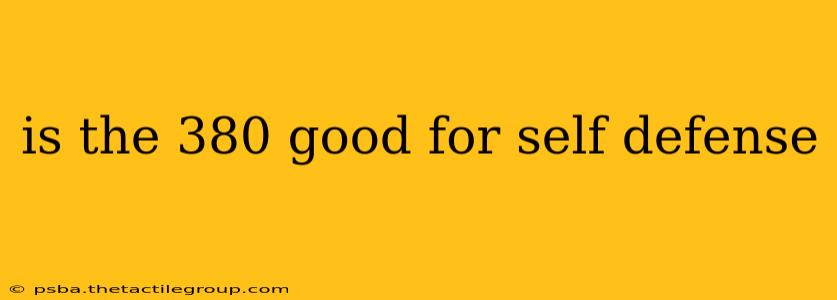Is the .380 Good for Self-Defense? A Comprehensive Look at Caliber Capabilities
The question of whether a .380 ACP (Automatic Colt Pistol) is suitable for self-defense is complex, sparking passionate debate among firearms enthusiasts and self-defense experts. There's no single definitive answer, as the effectiveness of any firearm depends heavily on factors beyond just the caliber. However, a thorough examination of the .380's strengths and weaknesses will help you make an informed decision.
Understanding the .380 ACP: Strengths and Weaknesses
The .380 ACP is a relatively small and lightweight cartridge, often favored for its concealability. This makes it a popular choice for individuals seeking a handgun for personal protection in situations where a larger caliber might be impractical or uncomfortable to carry concealed.
Strengths:
- Concealability: Its compact size and lighter recoil make it ideal for concealed carry, particularly for individuals with smaller hands or those new to firearms.
- Reduced Recoil: The lower recoil makes it easier to control, especially for less experienced shooters, leading to faster follow-up shots.
- Availability and Cost: .380 ACP ammunition is widely available and generally more affordable than some larger calibers.
- Lightweight Handguns: Many .380 handguns are lightweight, making them comfortable to carry throughout the day.
Weaknesses:
- Stopping Power: This is arguably the .380's biggest drawback. Compared to larger calibers like 9mm or .45 ACP, the .380 generally has less stopping power. This means it may require more precise shot placement to incapacitate a threat effectively.
- Penetration: The smaller bullet may not penetrate deeply enough to reliably stop a threat, especially through clothing or barriers. This is crucial in self-defense scenarios where you need to ensure the threat is neutralized.
- Accuracy at Distance: While accurate at close range, the .380's accuracy can suffer at longer distances, limiting its effectiveness in less confined spaces.
Factors Beyond Caliber: Crucial Considerations for Self-Defense
Choosing a firearm for self-defense involves much more than just the caliber. Here are critical elements to consider:
- Training: Regardless of the caliber, proper training is paramount. Knowing how to accurately and safely handle your firearm, including proper shooting techniques and situational awareness, is crucial for effective self-defense.
- Shot Placement: Accurate shot placement is far more critical than caliber. A well-placed shot from a .380 can be more effective than many poorly placed shots from a larger caliber.
- Reliability: The firearm itself needs to be reliable, functioning flawlessly under stress. Choose a reputable manufacturer and maintain your firearm regularly.
- Personal Factors: Consider your physical strength, hand size, and experience level when selecting a firearm. A comfortable and manageable firearm will enhance your ability to use it effectively under pressure.
- Legal Considerations: Understand the laws and regulations regarding firearms in your area.
Alternatives to Consider
If you're concerned about the .380's stopping power, consider alternatives like the 9mm, which offers a better balance of concealability, stopping power, and manageable recoil. However, the 9mm typically comes with a slightly larger and heavier firearm.
Conclusion: Making the Right Choice
The .380 ACP can be a viable option for self-defense, particularly for those prioritizing concealability and ease of handling. However, it's crucial to acknowledge its limitations regarding stopping power and penetration. Thorough training, proper shot placement, and a realistic understanding of the firearm's capabilities are essential for responsible self-defense. Ultimately, the best self-defense firearm is the one you can handle effectively, comfortably, and reliably. This requires careful consideration of your individual needs and circumstances, coupled with professional firearms training. Remember to always consult with a firearms expert and comply with all relevant laws and regulations.

